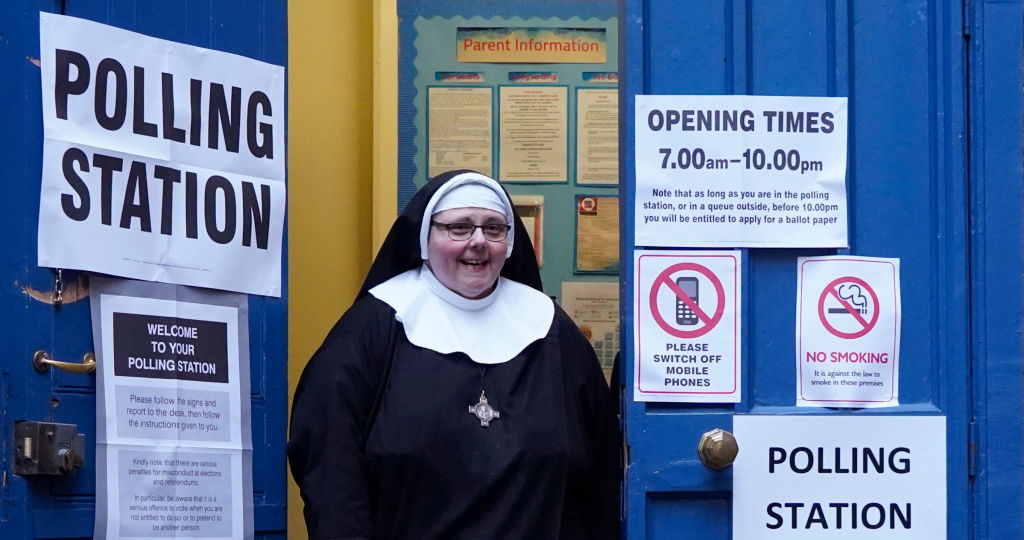Did religious belief have any significant impact upon the vote for Brexit? A new book, Religion and Euroscepticism in Brexit Britain, by Ekaterina Kolpinskaya and Stuart Fox, argues that it did have a small but significant influence, given that a narrow majority of British people still claim religious affiliation as one aspect of their identity.
The authors come to some interesting conclusions: notably that the unusual distribution of political allegiance across the Left-to-Right spectrum among British Christians has diminished, just as it has in the United States. Catholics have switched from Labour to Conservatives in large numbers and Nonconformists have increasingly deserted both Labour and the Liberal Democrats. This approximates the Anglo-Saxon world more to the Continental one, where Left and Right has often corresponded to secular versus sacred, and raises the prospect of the British Conservative party becoming more like a Christian Democratic one, at least in terms of its social make-up.
Kolpinskaya and Fox clearly imply that the reasons for this shift among the religious laity are the increasing desertion of small ‘c’ conservatism by the parties of the Left: of respect for traditional institutions, symbols and rituals, of concern for cultural cohesion (including largely unspoken worries about Islam) and for marriage and the family. They also make it clear that a relative increase in Euroscepticism among religious people is only a sub-set of this more general shift in perception.
Despite this overall change, the continuing influence of an ethical internationalism ensured that actual church-goers still voted in the referendum by a large majority for Remain. The authors nonetheless make much of the fact that Anglicans and Presbyterians, members of ‘national’ churches, voted considerably more heavily for Brexit than did Catholics or Nonconformists. However, since this figure comprises mostly those with a rather nominal church allegiance, religion might be an insignificant element of a general patriotic attachment to national tradition.
In consequence, the conclusion of the book appears to be rather thin.
It ignores something far more striking: the apparent geographical survival of sectarian allegiances that once, at least, had a strong religious component — a secular echo of bitter past conflicts among British Christians. Thus, the most traditionally Tory and Anglican areas of the South East, Central South and South Midlands were the strongest for Remain outside London. Besides Catholic Liverpool, old Recusant areas in the North West and around York also went for Remain, in contrast to the old more Nonconformist areas of the North in general.
The traditionally Roundhead East was the most heavily pro-Leave, while Leave also won out in previously Dissenting Cornwall and South Wales.
This would seem to confirm Robert Tombs’ view that British politics is often more guided by inherited post-religious ‘shibboleths’ than by class or ideology. For these regional demographic differences to a degree overrode those of relative prosperity, or of rural versus urban. A fear of ‘Popery’ and Continental tyranny still seems to resound in the subconscious of the Eastern littoral, as in the far West where the Anglican church was also less dominant.
Both Catholics and Anglicans have drifted more towards an anti-EU stance over the past thirty years, but this is part of a general drift away from the liberal-Left and its globalising liberalism. That is largely due to the historical tendency of both Catholics and middle-of-the road to high Anglicans to be less suspicious of the Continent and Catholicism than lower church Anglicans and dissenters are.
But this drift surely does not include, as Kolpsinskaya and Fox allege, a general embrace of ‘Right-wing economics’: it is rather an expression of a conservative communitarianism, both economically and culturally, among people who feel more obviously marginalised. This attitude, understandably — if debatably — is causing an increasing number of religious people to be wary of the EU as today being mainly a liberal monetary and technocratic project.










Join the discussion
Join like minded readers that support our journalism by becoming a paid subscriber
To join the discussion in the comments, become a paid subscriber.
Join like minded readers that support our journalism, read unlimited articles and enjoy other subscriber-only benefits.
Subscribe